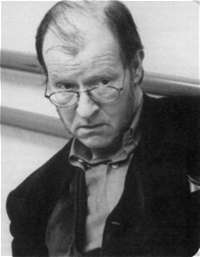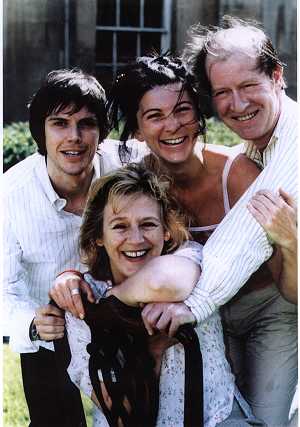

|
Certain voluble critics have taken umbrage at the National's decision to saddle up that middlebrow warhorse The Heiress for a canter round the Lyttleton this month. But any doubts about its suitability will surely be silenced by the spectacle of the incomparable Alan Howard dominating the stage as the fierce pater of the eponymous heiress, played by luminous newcomer Eve Best. An authoritative figure in the footlights, but a modest and self-effacing personality offstage, Howard's presence, his incisive intelligence and that distinctive cawing delivery cutting like a scalpel to the heart of the text, will recall to many the extraordinarily rich period he spent at the RSC in the 1970s. His Antony, Coriolanus and Oberon for the RSC, as well as his unlikely doublings of Henry V and VI and Richard II and III, were prodigious achievements demanding awesome levels of energy and commitment. Howard is amazed by his own industry: "I try not to look back too much, but when I do think about those days, I wonder how on earth I could have done all that." |
 |
Ironically, despite Howard's presence as an RSC Honorary Artist, he has not worked for the company for nearly 20 years. "Working at Stratford would cause a helluva problem domestically," he explains. "It's very hard on your partner, expecting her to play 'Mrs. Theatre'. And it's been difficult for me to escape from the pigeon-hole marked 'Shakespearean actor' and be considered for more film and television work."
Howard has made occasional appearances on camera - more occasional than he would like, one suspects - most notably in Peter Greenaway's The Cook, The Thief, His Wifer & Her Lover. But arguably his acting style seems unhappy with the constraints of film - and television in particular. So it is that the Old Vic and the National have been the beneficiaries of his preference for company work and a happy home life. As well as an acclaimed Waiting for Godot for Peter Hall, Howard's other ventures south of the river have included a dazzling Higgins in Pygmalion, a seriously undervalued Macbeth for director Richard Eyre and a finely judged performance in the potentially overheated Les Parents Terribles. Now he returns to the Lyttleton with The Heiress, surprised, he says, by the richness of a play he'd been inclined to consider comfortable boulevard fodder.
"I expected it to be much creakier than it is," he says. "Of course, it's a 'well-made play', but it's one written with considerable depth. It comes over as a bit like Ibsen in English. Also, there are no easy moral answers in it. Everybody is right and at the same time everybody is wrong. By the end of the play, people will have had to make up their own mind."
Dr. Sloper, Howard's character, can appear a typically stern Victorian paterfamilias, complete with the sideboards Howard fingers rather uneasily. "I don't find him at all forbidding," he argues. "He's a very clever man, a highly successful doctor who is a cut above the usual practitioner. He tries very hard - perhaps that's his biggest mistake - to bring up his daughter to be a replica of the wife he only knew for a year and who died in childbirth. Ideally, he'd like his daughter to be somebody like Madame Curie - which palpably she isn't."
Despite the literary influences at home - his partner is the novelist Sally Beauman - Howard has no plans to commit his life or his thoughts on acting to paper. His natural modesty inhibits him, while he is also unconvinced about the feasibility of pinning down in words the evanescence of the theatrical performance. "The theatre is so ephemeral," he argues. "A performance happens once and then it is gone forever. It will not and cannot ever be the same and there are a host of random factors contributing to the success - or failure - of a performance. Any attempt to express what is happening also impinges on the possibility of something unknown occurring between any two actors. You can compare acting to playing tennis. There is a court and two rackets but the way in which the ball travels between the two players cannot be determined in advance."
Teaching is summarily dismissed: "I'd be useless." Nor is Howard in any hurry to repeat his single experience of directing "a really weird play by a Canadian that involved a waxwork" on the RSC Fringe in the 1970s. It merely served to strengthen his opinion that "you start out in this business thinking you know what it's all about and then there comes a point when you realise you know nothing. As a director I'd find it very difficult to say to an actor: 'Don't do that, it's wrong.' How can anyone be so sure?"
For all his rather wistful hankering after a more visible film and television presence, Howard is more than comfortable with his comparative anonymity. Both his personal inclination and the way in which his career has progressed have ensured that he is not widely known outside the Stage Door. Grateful theatre audiences will selfishly hope that they can keep the secret of Alan Howard to themselves for a little while longer.
Al Senter
What's On In London, 7.6.00

|
After London, The Heiress continued touring, ending its run in Bath. The photograph shows Ben Porter, Eve Best, Alan and Maggie Steed. |